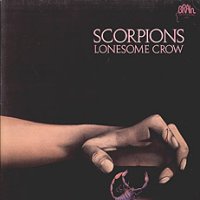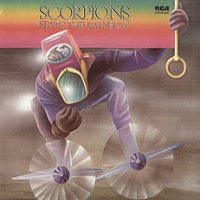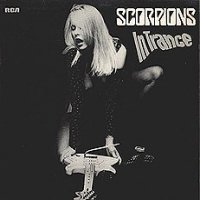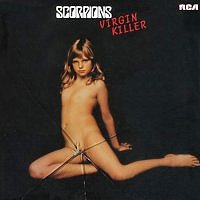|
Scorpions - "Lonesome Crow" (Brain 1972)
 Before drowning every inch of their credibility in a stream of commercial and crappy cheese-metal, Scorpions were probably the best German hard rock band. They formed already back in 1965 in their very early teens, but didn't release their first album before seven years later. The line-up of the band in 1972 consisted of Klaus Meine on vocals, brothers Rudolf and Michael Schenker on guitars, Wolfgang Dziony on drums and Lothar Heimberg on bass. "Lonesome Crow" was the very first album on the excellent Brain label that would release some of the best progressive rock to come from Germany. The record itself is the biggest anomaly in Scorpions' catalogue, sounding nothing like anything they would release later. The biggest influence on the album was undoubtedly early Black Sabbath, but "Lonesome Crow" is a bit more psychedelic and without the occult stuff. The opener "I'm Going Mad" pretty much sets the standard for the rest of the record, with it's heavy and doom-laden guitars and dark, 60's sounding vocal harmonies. "It All Depends" sounds extremely much like something from the two first Black Sabbath albums, and "Leave Me" features repetitive wordless vocal harmonies under Meine's wailing vocals, which by the way also were different from how he would sing on later albums. They also attempt some rather complex structures in "In Search of the Peace of Mind" and "Inheritance" and succeed quite well, especially on the latter one. "Action" has some swinging jazzy and bluesy rhythms that again bring comparisons to very early Black Sabbath. The title-track is stretched to over 13 minutes by lots of intense jamming, and the young Schenker-brothers deliver an impressive performance. I also like the way the track returns to the beginning at the end, but now slightly calmer and less heavy. "Lonesome Crow" is hopelessly misunderstood by mainstream fans of the band, and sadly overlooked by people who don't know that Scorpions actually were a good band before they became a cheesy arena act. Before drowning every inch of their credibility in a stream of commercial and crappy cheese-metal, Scorpions were probably the best German hard rock band. They formed already back in 1965 in their very early teens, but didn't release their first album before seven years later. The line-up of the band in 1972 consisted of Klaus Meine on vocals, brothers Rudolf and Michael Schenker on guitars, Wolfgang Dziony on drums and Lothar Heimberg on bass. "Lonesome Crow" was the very first album on the excellent Brain label that would release some of the best progressive rock to come from Germany. The record itself is the biggest anomaly in Scorpions' catalogue, sounding nothing like anything they would release later. The biggest influence on the album was undoubtedly early Black Sabbath, but "Lonesome Crow" is a bit more psychedelic and without the occult stuff. The opener "I'm Going Mad" pretty much sets the standard for the rest of the record, with it's heavy and doom-laden guitars and dark, 60's sounding vocal harmonies. "It All Depends" sounds extremely much like something from the two first Black Sabbath albums, and "Leave Me" features repetitive wordless vocal harmonies under Meine's wailing vocals, which by the way also were different from how he would sing on later albums. They also attempt some rather complex structures in "In Search of the Peace of Mind" and "Inheritance" and succeed quite well, especially on the latter one. "Action" has some swinging jazzy and bluesy rhythms that again bring comparisons to very early Black Sabbath. The title-track is stretched to over 13 minutes by lots of intense jamming, and the young Schenker-brothers deliver an impressive performance. I also like the way the track returns to the beginning at the end, but now slightly calmer and less heavy. "Lonesome Crow" is hopelessly misunderstood by mainstream fans of the band, and sadly overlooked by people who don't know that Scorpions actually were a good band before they became a cheesy arena act.
Scorpions - "Fly to the Rainbow" (RCA 1974)
 Things had changed with Scorpions since their debut two years earlier. Michael Schenker had left to join the then much more successful British band UFO, and was replaced by the excellent Uli Jon Roth who quickly would become very important in the band. Heimberg and Dziony were also out of the band, and had been replaced by Francis Buchholz and Jürgen Rosenthal. The band had also switched label from Brain to RCA that gave them far bigger hopes for an international breakthrough. "Fly to the Rainbow" is a transitional album and suffers slightly from that too, but most of it is still good. The opener "Speedy's Coming" is a fast, fresh and catchy hard rocker that would have been completely out of place on the debut, and clearly pointed out a new direction for the band. "They Need a Million" finds the band back in the more experimental territory of their debut again, but lighter and with a guest appearance of Achim Kirschning on synths. Roth's first contribution to the band comes with "Drifting Sun" that is based in a riff that already had been used in Jimi Hendrix' "Spanish Castle Magic" and Chicago's "25 or 6 to 4", but it's never the less a powerful and enjoyable heavy rocker that showcases some of his skills, but unfortunately also his poor vocals. The boring and worthless "Fly People Fly" is the definitive low point of the album, and showed clearly that the band hadn't quite got the grip on the more ballad-oriented stuff yet. "This is My Song" is a track with certain similarities to classic Wishbone Ash, and the band toyed with progressive arrangements on "Far Away" that features organ and some Mellotron. Still, the highlight of the album came with the nearly 10-minute title-track. It starts as an acoustic, folk-inflected tune but turns quickly into a fast-paced epic song that climaxes into a grandiose psychedelic finale. Things had changed with Scorpions since their debut two years earlier. Michael Schenker had left to join the then much more successful British band UFO, and was replaced by the excellent Uli Jon Roth who quickly would become very important in the band. Heimberg and Dziony were also out of the band, and had been replaced by Francis Buchholz and Jürgen Rosenthal. The band had also switched label from Brain to RCA that gave them far bigger hopes for an international breakthrough. "Fly to the Rainbow" is a transitional album and suffers slightly from that too, but most of it is still good. The opener "Speedy's Coming" is a fast, fresh and catchy hard rocker that would have been completely out of place on the debut, and clearly pointed out a new direction for the band. "They Need a Million" finds the band back in the more experimental territory of their debut again, but lighter and with a guest appearance of Achim Kirschning on synths. Roth's first contribution to the band comes with "Drifting Sun" that is based in a riff that already had been used in Jimi Hendrix' "Spanish Castle Magic" and Chicago's "25 or 6 to 4", but it's never the less a powerful and enjoyable heavy rocker that showcases some of his skills, but unfortunately also his poor vocals. The boring and worthless "Fly People Fly" is the definitive low point of the album, and showed clearly that the band hadn't quite got the grip on the more ballad-oriented stuff yet. "This is My Song" is a track with certain similarities to classic Wishbone Ash, and the band toyed with progressive arrangements on "Far Away" that features organ and some Mellotron. Still, the highlight of the album came with the nearly 10-minute title-track. It starts as an acoustic, folk-inflected tune but turns quickly into a fast-paced epic song that climaxes into a grandiose psychedelic finale.
Scorpions - "In Trance" (RCA 1975)
 Rosenthal left Scorpions after "Fly to the Rainbow" and went on to more progressive realms when he became the drummer in the best line-up of Eloy. The new drummer Rudy Lenners completed the line-up of Scorpions that would record their two best albums. "In Trance" is a classic of melodic '70s hard rock, and the band sounded better and more confident than ever before. The album kicks off loud and aggressive with Roth's "Dark Lady". Roth handles the vocals himself as on many of his other songs, but the main hook of the track is actually Meine's ear-piercing scream that leads up to the chorus. The title-track is one of Scorpions' finest songs ever, and a good example of classic melodic '70s rock at its best. "Life's Like a River" is the first of two straightforward ballads on the album, and shows together with the superior "Living and Dying" that the band had found the formula for their power ballads. The dynamic and powerful "Top of the Bill" has an impressively big sound, even for being a rather simple heavy rocker. Side 2 starts with "Robot Man", one of the most perfect singles the band ever had, featuring a fast-paced verse and an irresistibly catchy chorus complete with some robotic distortion on the vocals. Roth's dark and emotional "Evening Wind" is the only song with a somewhat epic feel on the record, and showed that he clearly was the more adventurous songwriter in the band, opposed to Meine and Schenker whose songs usually either were fairly straightforward heavy rockers or power ballads. He goes for a slow, bluesy shuffle in "Sun in My Hand" with lots of great guitar works, and also wrote "Longing for Fire" together with Schenker, featuring a quite psychedelic melody. The closing number "Night Lights" is an even bigger surprise, being an atmospheric instrumental with discreet Mellotron-backing and sounding like laid-back Focus or even more like Sebastian Hardie! Rosenthal left Scorpions after "Fly to the Rainbow" and went on to more progressive realms when he became the drummer in the best line-up of Eloy. The new drummer Rudy Lenners completed the line-up of Scorpions that would record their two best albums. "In Trance" is a classic of melodic '70s hard rock, and the band sounded better and more confident than ever before. The album kicks off loud and aggressive with Roth's "Dark Lady". Roth handles the vocals himself as on many of his other songs, but the main hook of the track is actually Meine's ear-piercing scream that leads up to the chorus. The title-track is one of Scorpions' finest songs ever, and a good example of classic melodic '70s rock at its best. "Life's Like a River" is the first of two straightforward ballads on the album, and shows together with the superior "Living and Dying" that the band had found the formula for their power ballads. The dynamic and powerful "Top of the Bill" has an impressively big sound, even for being a rather simple heavy rocker. Side 2 starts with "Robot Man", one of the most perfect singles the band ever had, featuring a fast-paced verse and an irresistibly catchy chorus complete with some robotic distortion on the vocals. Roth's dark and emotional "Evening Wind" is the only song with a somewhat epic feel on the record, and showed that he clearly was the more adventurous songwriter in the band, opposed to Meine and Schenker whose songs usually either were fairly straightforward heavy rockers or power ballads. He goes for a slow, bluesy shuffle in "Sun in My Hand" with lots of great guitar works, and also wrote "Longing for Fire" together with Schenker, featuring a quite psychedelic melody. The closing number "Night Lights" is an even bigger surprise, being an atmospheric instrumental with discreet Mellotron-backing and sounding like laid-back Focus or even more like Sebastian Hardie!
Scorpions - "Virgin Killer" (RCA 1976)
 "Virgin Killer" is a slightly rougher, heavier and also more basic album than "In Trance". It includes some of the most brutal material Scorpions ever delivered. The furious title-track shows the band at their most aggressive, and revealed that even Roth had partly put some of his more ambitious sides away, and went for some more dirty and raw heavy rock in "Hell-Cat" and "Polar Nights". Especially the latter one featured plenty of his shredding playing style that was far ahead of its time. "Catch Your Train" is one of the band's catchiest (no pun intended) and overlooked songs, and "Backstage Queen" has a basic and enjoyable rock'n'roll feel. The opener "Pictured Life" shows the band's craftsmanship at its most inspired, and is one of the very few songs that have its main riff in the chorus instead of in the verse. The obligatory power ballad comes with "In Your Park". Most of the album consisted of fairly straightforward and basic songs, but it didn't mean that the band had lost their ability to come up with some more intricate songs too. "Yellow Raven" starts as a ballad with some Hendrix-influenced guitar from Roth, but climaxes in a dark, heavy and doom-laden instrumental part reminiscent of Black Sabbath. The track was musically and lyrically almost a return to the debut, although in a more polished form. And "Crying Days" is also nearly epic in structure, featuring some good harmonies. "Virgin Killer" was Scorpions' definitive breakthrough home in Germany where it was voted as "LP of the year" in 1976. And needless to say, the cover also stirred up enough well-calculated and intentional controversy to give the album even some more attention. But success often comes at a price, and in Scorpions' case it would sadly turn out to be the musical quality itself. After "Virgin Killer", the band started a gradual turn toward a slicker sound. Roth obviously sensed this, and was out of the band before the decade was over. Their first real sell-out came ironically when they switched label from RCA to the far more progressive Harvest and released the overrated "Lovedrive" in 1979 where they pretty much had decreased into mindless party metal where all the songs sounded the same. You should better stick to the albums reviewed here. "Virgin Killer" is a slightly rougher, heavier and also more basic album than "In Trance". It includes some of the most brutal material Scorpions ever delivered. The furious title-track shows the band at their most aggressive, and revealed that even Roth had partly put some of his more ambitious sides away, and went for some more dirty and raw heavy rock in "Hell-Cat" and "Polar Nights". Especially the latter one featured plenty of his shredding playing style that was far ahead of its time. "Catch Your Train" is one of the band's catchiest (no pun intended) and overlooked songs, and "Backstage Queen" has a basic and enjoyable rock'n'roll feel. The opener "Pictured Life" shows the band's craftsmanship at its most inspired, and is one of the very few songs that have its main riff in the chorus instead of in the verse. The obligatory power ballad comes with "In Your Park". Most of the album consisted of fairly straightforward and basic songs, but it didn't mean that the band had lost their ability to come up with some more intricate songs too. "Yellow Raven" starts as a ballad with some Hendrix-influenced guitar from Roth, but climaxes in a dark, heavy and doom-laden instrumental part reminiscent of Black Sabbath. The track was musically and lyrically almost a return to the debut, although in a more polished form. And "Crying Days" is also nearly epic in structure, featuring some good harmonies. "Virgin Killer" was Scorpions' definitive breakthrough home in Germany where it was voted as "LP of the year" in 1976. And needless to say, the cover also stirred up enough well-calculated and intentional controversy to give the album even some more attention. But success often comes at a price, and in Scorpions' case it would sadly turn out to be the musical quality itself. After "Virgin Killer", the band started a gradual turn toward a slicker sound. Roth obviously sensed this, and was out of the band before the decade was over. Their first real sell-out came ironically when they switched label from RCA to the far more progressive Harvest and released the overrated "Lovedrive" in 1979 where they pretty much had decreased into mindless party metal where all the songs sounded the same. You should better stick to the albums reviewed here.
Label

|